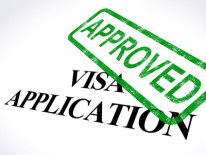Canada Immigration Waivers for Criminal Convictions
 Canada has strict rules prohibiting the admission of persons who have been convicted of certain criminal offenses. Many people have stopped at the border in recent years because of the increased flow of criminal record information between Canada and other countries. In many cases, we can help you overcome your problem by applying for Rehabilitation or a Temporary Resident Permit (TRP).
Canada has strict rules prohibiting the admission of persons who have been convicted of certain criminal offenses. Many people have stopped at the border in recent years because of the increased flow of criminal record information between Canada and other countries. In many cases, we can help you overcome your problem by applying for Rehabilitation or a Temporary Resident Permit (TRP).
Who is Inadmissible
There are three types of crimes in Canada: minor crimes, known as “summary offenses”; serious crimes, known as “indictable offenses;” and crimes that may be prosecuted as either summary or indictable offenses, known as “hybrid offenses.” You are inadmissible to Canada if you have been convicted in Canada of either an indictable offense or a hybrid offense. You are also inadmissible if you have been convicted outside of Canada of a crime that would be considered either an indictable offense or a hybrid offense if it was committed in Canada.
Unfortunately, most crimes in Canada are either indictable offenses or hybrid offenses. This includes driving under the influence of alcohol, reckless driving, all theft offenses, and most controlled substance offenses. It doesn’t matter how serious the crime is considered in the United States or other country where the crime was committed. What matters is how the crime is classified in Canada.
There are several ways to overcome criminal inadmissibility.
To begin with, it is important to determine whether the person is really inadmissible. The offense may be a summary offense in Canada, or may not be a crime in Canada at all. This requires careful study of the crime of conviction, compared with the Canadian Criminal Code. For instance, certain types of sexual activity between adults may be legal in Canada even though the same activities may be a crime in other countries. Even if the offense is a crime in Canada, Canada will often recognize pardons or expungement proceedings that are similar to the pardon process in Canada.
Rehabilitation
If it turns out the person is in fact inadmissible, a person may be eligible for “deemed rehabilitation.” This means the person is no longer inadmissible. A person is “deemed rehabilitated” If (1) the person has committed only one criminal offense; (2) the penalty for that offense in Canada is less than ten years in prison and (3) at least ten years have gone by since the person completed all sentences and penalties for the offense. As a result, a person with a single DUI (committed before December 18, 2018) and no other criminal record will be deemed rehabilitated ten years after the completion of all sentences, including a license suspension. Although no formal application is required, it is important to assemble all of the court records to clearly demonstrate that the person meets all the requirements.
If a person is not eligible for deemed rehabilitation, a person may be able to file an application for actual “rehabilitation” through a formal process. These applications are normally filed through one of the Canadian consulates in the United States or the country where the person lives. There is a filing fee of $200 for minor offenses, and $1,000 for serious offenses. (A serious offense is a crime that may be punished by 10 years or more of prison time in Canada.) If the application is approved, the person is no longer inadmissible for that offense. A person can file for rehabilitation regardless of the number of offenses in his or her background. However, five years must have passed since the completion of all sentences or penalties. Approval of the application is not automatic. The Canadian government must be convinced that the person is truly rehabilitated, and no longer poses a danger to Canadian society. This usually requires convincing reference letters from reputable persons with knowledge of the offense or offenses, and other evidence of the person’s good character. The government will also consider the seriousness of the offenses and the reason the person needs to travel to Canada.
Temporary resident permits
Finally, a person may apply for a “Temporary Resident Permit,” known as a TRP. This is available for persons who do not yet qualify for rehabilitation because five years have not yet gone by. An application for a TRP is also made at a consulate. It is also available in urgent situations at a port of entry. In either case, the immigration officer will carefully consider the seriousness of the offenses, how recent they were, and how important it is for the person to travel to Canada.
Both the application for rehabilitation and the application for a TRP require complete court records, and up to date criminal record checks. A persuasive application package takes time and effort. In our experience, the time and expense involved are justified only if there are important personal or economic reasons to visit Canada, such as an employment opportunity in Canada. In such circumstances we have helped many people overcome their inadmissibility to Canada. Please contact us if you would like advice or assistance with your own case.


